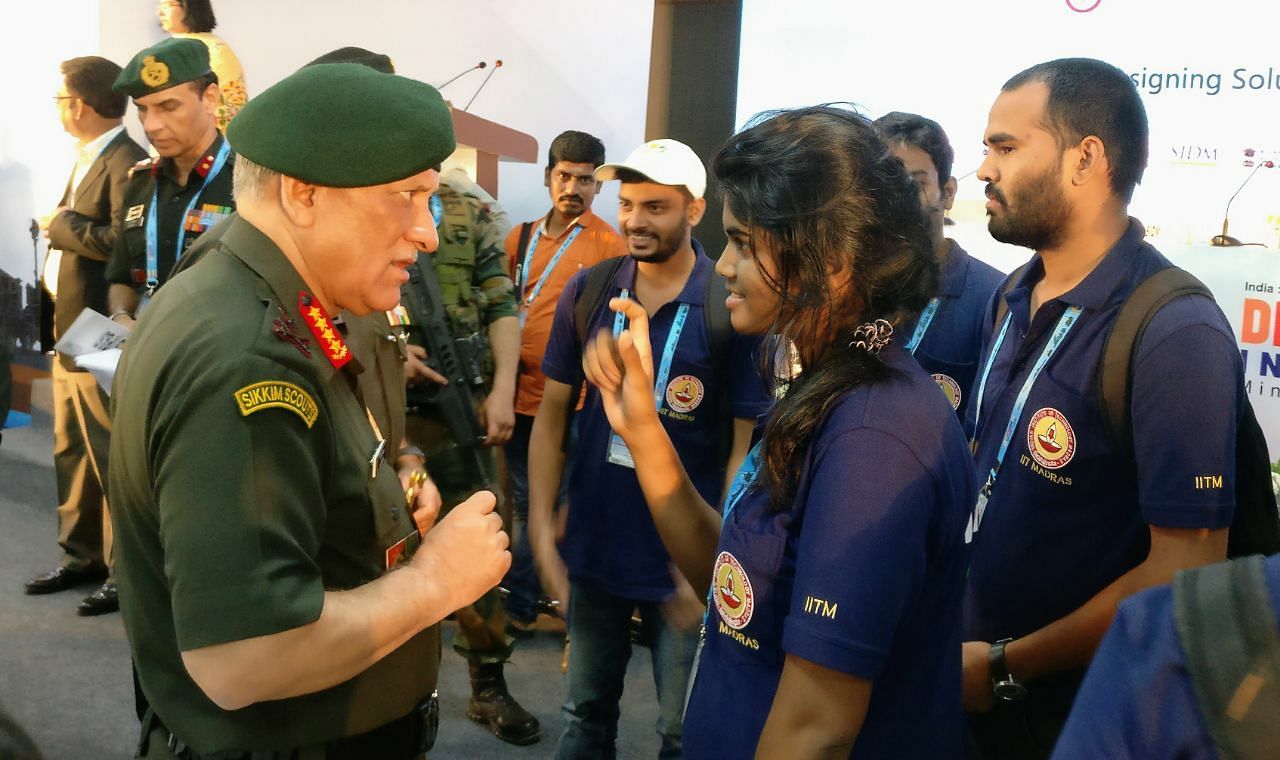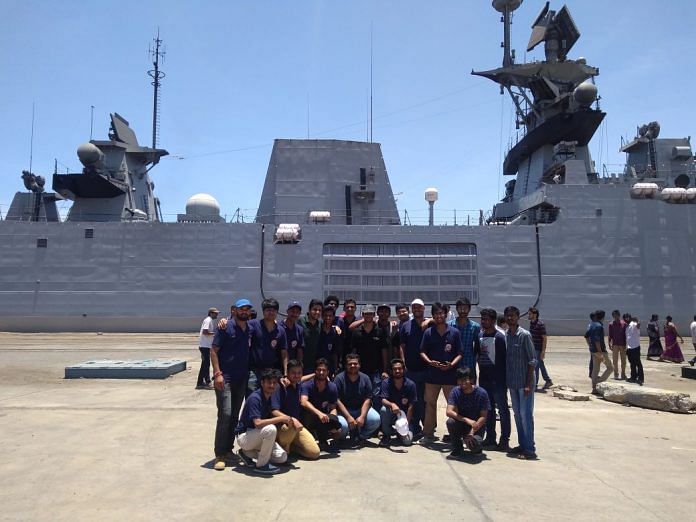Academic institutions of international repute like the IITs should be partners in producing cutting-edge military technologies.
By 2030, India’s doorstep adversaries will be a hi-tech, world-dominating China and its toxic cat’s paw Pakistan. Let’s face it. Militarily, India’s import dependence for defence equipment will not reduce by then because Make in India has already missed its mark. For reasons well-known, indigenous defence industry has not delivered. Now, after the controversy over the Rafale fighter jet deal, our defence import and procurement procedures will inevitably decelerate.
Need outcome-oriented efforts
Our talent and potential have been showcased to the world by Sundar Pichais and Satya Nadellas and many more who are powering companies such as Microsoft, Google, Apple and Amazon. It is now time to create talent that can be used for India’s defence indigenisation. Despite a realisation in the government and military circles, the academic path to indigenisation remains hazy.
The faculty at IIT Madras is evolving a model that must be nurtured and replicated. In January 2018, a course on ‘Overview of Defence Technologies’ was introduced at IIT Madras as an elective. In each semester, since then, over 100 PhD, MTech, MS and BTech students across disciplines enrolled in the course. They got practical exposure by attending DefExpo, visiting Indian Navy ships, L&T shipyard, and Officers Training Academy, Chennai. Students interacted with defence officers, scientists and the industry, including the defence minister and chief of the Army staff.
Students want to contribute to the domestic defence industry and, in response, the ministry of defence and the armed forces have started an outreach programme with the IIT. However, their approach needs focus and must go beyond exploratory, superficial, tick-the-box efforts. It must be outcome-oriented and not incremental.
Also read: Shakti: IIT-Madras develops India’s first indigenous microprocessor
Contrast this with China, which has over 2,500 military scientists/engineers studying defence technologies abroad, including navigation technology, computer science, artificial intelligence, hypersonic scramjets, and high-energy lasers.
In a recent article, China expert Claude Arpi wrote about how Australia, Canada, New Zealand, UK, US, Germany and Singapore are virtually sponsoring China’s defence researches.
Exposure to defence issues
India must make courses like the ‘Overview of Defence Technologies’ an elective across all IITs and other technical institutes. Select IITs/IISc should run MTech courses with specialisation in defence technologies like the UK’s Cranfield University does. In addition, we also need MTech/MBA programmes to cover subjects like defence procurement. We must graduate to PhD programmes on niche defence-related technologies.

Over 200-250 armed forces’ officers do MTech courses in IITs on regular subjects at any given time. This framework can easily be tweaked to focus on defence technology and procurement and will result in tremendous payoffs.
There is no alternative to knowledge superiority. Academic partnerships, linkages and exchange programmes should be developed between selected institutions and schools of instruction of the armed forces. Our young scientific and engineering minds need exposure to defence issues through seminars and events like Aero India and DefExpo. Our IITians participate in Mars Rover and Hyperloop competitions internationally. Similarly, defence-related competitions should be held routinely at tech fests in India to unearth talent and ideas. In, addition, they should be made to take up internships at defence institutions.
Also read: An IIT grad’s little-known firm will now make bulletproof jackets for the Indian Army
Benefits for future
Select academic institutions should undertake projects in blue sky research and develop technologies/products for import substitution/upgradation. These projects could be in standalone mode or in conjunction with the Defence Research and Development Organisation (DRDO), Ordnance Factories Board (OFB) or Defence Public Sector Undertakings (DPSUs).
Our academic institutions of international repute can no more be treated as appendages or competitors in defence research and production. They should instead be partners for producing cutting-edge military technologies.
IITs have tremendous research expertise. For example at IIT Madras alone, ISRO (since 1990), Railways (since 2017), DRDO (since 2012) and Indira Gandhi Centre for Atomic Research have established centres for joint research. Nearly 200 MoUs exist with the industry for sponsored research, focused academic programmes, and consultancy. In the same vein, Services should establish dedicated research centres and run exclusive programmes in select IITs based on their expertise.
Also read: In presentation to PMO, junior defence minister admits Make in India hasn’t taken off
Indian Navy has an MoU with IIT Delhi since 1978 and has benefitted immensely in naval construction. Other Services should follow this lead. A comprehensive pilot programme can build on the initiatives of IIT Madras. Without focus, we will be all over the place and end up nowhere.
Finally, I got a call recently from someone in Ernst and Young who wanted to consult us on their plan for the southern defence corridor. Just imagine. MoD consults someone for the defence corridor who, in turn, consults IIT Madras. Round tripping? The MoD might as well come to IIT Madras directly. Old habits die hard, I suppose.
The author is professor, Aerospace Dept, IIT Madras.




https://gangstalkingmindcontrolcults.com/are-lockheed-martin-and-northrup-grumman-making-equipment-used-in-military-gang-stalking-electronic-torture-mind-control-operations/
Ethics of partnering between Bharat and US Defense Contractors needs to be discussed at national levels before TamilNadu defense industrial corridor gets concrete forms. Thanks. – An IIT Madras alumnus – and casualty of satellite-based electronic surveillance and harassment likely implemented by using Lockheed Martin devices.
We at MoD and at the service headquarters must be able to fix the ‘need’ first. No discussion, irrespective of magnitude and directions, can bring tangible results without the ‘need’ felt at all levels. Let’s see a Rashtriya Rifles Company Commander feeling the need for a ‘Motion sensor based, satellite assisted secure close loop network system’, that can be deployed while placing an ambush in the terrain akin to J&K and North East. We feel the need after seeing the weapon systems of developed countries. That’s not ‘need’, that’s desire. It leads to copying an existing technology and trying to fit into our requirements. Our ‘desire to compete’ must be replaced with ‘need to defend (effectively)’. Once we have the need fixed and accepted at all levels, we can put the brains to task with a reasonable time line.
Whoever is saying IITs are good in guzzling public money has obviously no idea of the amount of effort it takes to get into IIT and the effort it takes to sustain as a student without getting thrown out!
IITs are worth every rupee being spent and it is one of the few things positively associated with India everywhere in the world.
I have first hand experience of this having travelled to few countries myself.
Better late than never.
Indian industry has to open up and experiment with new things rather than screw-driver-technology.
In automotive, we do see bold moves from Bajaj, TVS, Tata, Ashok Leyland etc. Other industries and especially defence has to step up.
DRDO, NAL etc are not doing what they should be doing. So private players must come in and step up.
I am happy to read that my alma mater has started to focus on Defence technologies. Having worked in both public and private sectors during my career and also having interacted with IITs as part of my work as Executive Director at HAL Management Academy, I suggest the following for enhancing the work in this area:
1. The students and staff can make a comprehensive mapping and understanding the system of Defence technology and Defence equipment procurement as it is in practice and not as it is supposed to be. A Systems approach is required to be deployed and all the stakeholders need to be involved.
2. They can map the technology development processes for each of the Defence wings as they have different philosophies and approaches
3. They can then identify the weaknesses and strengths in the system and then support the various organizations in filling up the weaknesses.
In HAL in 2014 or so we had mapped the future technologies that will need to be developed.
The end result has to be an architecture of an institutional framework that usually impedes the progress in these areas. Organizational boundaries need to be redefined for effective collaboration, as I notice that the Academia, Industry and the users seem to be often rooted in their own organizational boundary and hence collaborations are weak.
Above all these, there has to be a shared over-arching vision that transcends organizational limitations and attracts people to work in multi-disciplinary and multi-institutional spaces with the passion to challenge assumptions that have led to the present situation.
IIT’s are only good at guzzling public funds in the name of researçh.
This article comes not a day too soon.
In 2012, I set up the country’s first ever Centre for Defence Technology Studies in Hindustan University at Chennai, offering a 2 year MBA programme in Defence Technology Management. This was done in collaboration with Cranfield University in the UK.
Regrettably the response from potential stake holders- end users and industry – was lukewarm.
IITM’s experiment in offering an elective on “overview of defence technologies” is indeed most welcome.
But we need a professional cadre of defence technology managers. This is not going ti
o happen ovetnight.
We need MOD as the sole customer for military hardware to mandate platform manufacturers in the first instance to put their employees, partucularly at management levels through such programmes.
Obviously, institutions like IITS must offer such programmes.
Mid level knowledge update courses and cerificate programmes must follow.
It will be a matter of time before platform manufacturers themselves demand qualified personnel in their Tier 1 and Tier 2 vendors in turn kick starting more institutions offering such programmes.